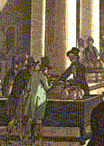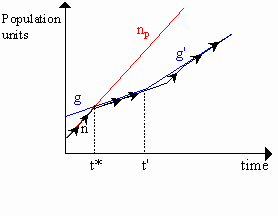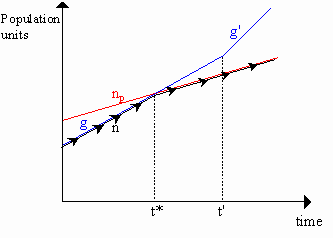|
Contents (A) The Enbourgoisement of the Proletariat For Malthus, the solution to the "misery and vice" problem was not to increase the rate of growth of subsistence. As we saw in Figure 2 (reproduced below), an increase from g to g' was followed immediately by a rise in population growth that absorbed the increase. He did not dispute that efforts at improving agricultural productivity and the like were commendable, but he believed it was highly unlikely that g could be raised sufficiently to the point where g > np. Placing our hopes on an increasing the productivity of food production, Malthus argued, would be like "setting the tortoise to catch the hare." (Malthus, 1872: p. 500).
The only way out of the trap, Malthus argued, was to somehow bring the potential rate of population growth, np, down. "If we can persuade the hare to go to sleep, the tortoise may have some chance of overtaking her." (1872: p.500). If np can be brought down to the point where np < g, then the situation depicted in Figure 3 (reproduced below) would apply. Actual population growth would grow at its potential rate, n = np, and g could increase all it will without inducing an increase in population after it. The wage-fertility dynamics would be disabled, the gap (g - n) would remain positive after t* and per capita income could rise forever.
What, in practical terms, could bring about such a wonderful state of affairs? Malthus (1798, 1872) argued that np is governed by social attitudes among the "lower" classes. The Malthusians (and later on, the Neo-Malthusians) developed all sorts of schemes to induce poor households to limit the number of children in their families. These run the gamut from the exhortation of moral restraint to encouraging the use of contraception. Again, as a clergyman, Malthus favored the former and would certainly not countenance the latter. Of course, Malthus himself was not so woolly-minded as to believe that the mere preaching of moral restraint would, in fact, lead to moral restraint. Moral restraint (or lack of it) is something that comes out of habit and environment. This is where Malthus steps out of his vestments of demographer and clergymen, and puts on the cloak of the social philosopher. (A) The Enbourgeoisement of the Proletariat Malthus believed that the middle classes were "obviously" more capable of moral restraint than the lower classes. "It has been generally found that the middle parts of society are most favorable to virtuous and industrious habits, and to the growth of all kinds of talents." (1872: 584). These habits -- prudence, planning, etc. -- automatically induced moral restraint in their sexual habits. Consequently, Malthus argued, the population problem might be solved "if the lower classes of society were thus diminished and the middle classes increased." (1872: p.585). Transforming the lower classes into middle classes might not be practicable without large-scale redistributions of property and income, along the lines of what was experienced in the French Revolution and advocated by European radicals. But Malthus argued that such a radical maneuver would probably be self-defeating. In other words, without an immediate (and thus unlikely) change in the habits of the poor upon ascension to their new property, the new income windfall would just induce the poor to reproduce even more. So, ultimately, Malthus argued, mass redistribution of income would not enrich the lower classes but only impoverish the middle classes. Society would now, more than ever, remain in the thrall of the Malthus Hypothesis. Malthus had a different solution to the problem. In his view, it was perfectly possible to inculcate in lower classes the habits of "sobriety, industry, independence and prudence" that "would approximate them, in some degree, to the middle classes of society, whose habits, generally speaking, are certainly superior." (Malthus, 1872: p.543). In other words, the poor should first become middle-class-like in their habits before having access to middle-class-like standards of living. Malthus argued that the enbourgeoisement of the lower classes could be done without the social upheaval of property redistribution or "socialist" experimentation. All that was needed was the removal of social institutions which (inadvertently) encourage "bad" habits (drunkedness, indigence, dependence, imprudence, etc.) while simultaneously introducing social institutions that promote "good" middle-class-like habits among the poor. Malthus believed that a government politically-committed to relatively mild reforms of social institutions could actually accomplish this. (B) Poor Law Reform For Malthus, the quintessential example of a "bad" social institution was the Poor Laws as they existed in England of the time. A large portion of Malthus's essay is dedicated to criticizing them (e.g. Malthus, 1798: Ch. 5; 1872: Bk. III, Ch.5-7). Between 1795 and 1834, the Poor Laws in Britain gave monetary assistance to wage earners so that they could maintain a minimum standard of living. This assistance is given in addition to wages, not in lieu of them. Malthus saw this "guaranteed minimum income" as an attempt to artificially inflate real incomes about their "natural" level. This, he argued, was self-defeating as the artificial rise in per capita income encouraged population growth which would then have to be naturally checked by more "misery and vice". Malthus noted that since the institutionalization of these Poor Laws, the incomes of the poor had not risen -- indeed they fell -- and he attributed this to an oversupply of labor created by the very Poor Laws themselves. [Note: What Malthus did not notice is that, with the Poor Laws, employers had an incentive to lower wages as well. Employers could depress the wages paid to laborers without starving them because they knew the parish would jump in an make up for the income loss. But that is yet another reason to criticize the Poor Laws] Not only were the Poor Laws fruitless in their objective, Malthus also believed that they were actually pernicious in their results. By their very nature and design, they encouraged the habits of dependence, indigence and immobility. By worsening the habits of the poor, the Poor Laws made them even less capable of moral restraint and thus made the population problem even more accute. "If the poor-laws had never existed", Malthus argued, "the aggregate mass of happiness among the common people would have been much greater than it is at present." (Malthus, 1798: p.36; 1872: p.369). Malthus was unequivocal in his call for the "gradual abolition" of the Poor Laws entirely and the establishment of a nation-wide free market for labor. David Ricardo (1817: p. 61) and, later, Harriet Martineau (1833) followed Malthus's lead. Among the reforms Malthus proposed were (1) the complete removal of all laws that tied recipients to their parish, thereby permitting the unemployed and distressed from searching for work in other parts of the country; (2) the removal of labor laws and statutes (e.g. regarding apprenticeships, wage scales, etc.) which prevented the free employment of labor; (3) for the truly desperate, the establishment of workhouses financed by nation-wide taxes but where "the fare should be hard, and those that were able obliged to work" (Malthus, 1798: p.37). However, among Malthus's opponents -- notably Ramsay McCulloch, James Mill and Nassau Senior -- the sentiment was different. They wanted to see the system reformed, not dismantled entirely. The 1834 Poor Law Amendment Act, partly written by Senior, replaced outdoor relief with indoor relief, approximating closely some of Malthus's recommendations but stopping short of outright eradication of the laws. (C) Enfranchisement and Indoctrination of the Poor But Malthus had carrots as well as sticks for the poor. He proposed a series of practical social reforms for the enbourgeoisement of the lower classes, which included the following four social institutions: "liberty, security of property, the diffusion of knowledge, and a taste for the conveniences and the comforts of life." (Malthus, 1872: p.543) The first, liberty, was perhaps the most radical of Malthus's recommendations. By this he meant that "respectability and importance which are given to the lower classes by equal laws, and the possession of some influence in the framing of them." (1872: p.522). Note that he makes a special point to argue that equality under the law is not enough. A free constitution and representative democracy with universal suffrage are necessary to give the lower classes a stake in society -- and also a better understanding of the limits of what is politically possible. The 1832 Parliamentary Reform Act, while not widening the franchise to the degree that Malthus had hoped, at least assured a more demographically-consistent representation, which was a step in the right direction. The second institution, the security of property, is a bit more ambiguous. Malthus recognized that the insecurity of property (in particular, its vulnerability to government appropriation) is hardly conducive to good habits of planning and prudence and, for that reason alone, property must be secured. However, he also acknowledged that once that law was in place, "inequality of conditions must necessarily follow. Those who were born after the division of property would come into a world already possessed... These are the unhappy persons, who in the great lottery of life have drawn a blank." (1872: Bk. III, Ch. 2). But this "inequality" result, Malthus argued, is inescapable. Wherever private property exists, unfairness necessarily follows. But the sense of unfairness could be reduced if the unlucky have a chance, by hard work, thrift, etc., of acquiring property and thus transcending their native station. The great danger of a system of private property, Malthus noted, is that this inequality may be ossified and made permanent by the laws and culture of society. Impermeable class boundaries would remove the very "stimulus to industry" which private ownership is designed to encourage. If the poor have no hope of rising and the rich no fear of falling, then security of property has accomplished nothing. For Malthus, therefore, security of property plus mobility between socio-economic classes are both necessary: "A state in which an inequality of conditions offers the natural rewards of good conduct, and inspires widely and generally the hopes of good rising and the fears of falling in society, is unquestionably the best suited to the exercise and improvement of human virtue." (1872: p.342) Malthus makes some brief comments on whether redistribution of property by political means (or otherwise) may actually inculcate the habits of prudence and planning among the poor. He admits that anecdotal evidence shows that poor cottagers who possess private property -- a few cows or a plot of land -- "are more industrious and more regular in their conduct than those who do not." (1872: p.582). However, he concludes from this that it is probably not the possession of property that has created the good habits, but rather the good habits that have enabled the acquisition of property. This inference may seem to contradict his earlier claims about the cultural power of property ownership, so he is careful to note that " I would by no means by understood to imply that the sudden possession of property never generates industrious habits" (ibid.). [Among others, Marx (1844, 1859, 1867), Engels (1845) and Taussig (1911: Ch. 52) have proposed this reverse causality between property-ownership and habits/fertility.] "Diffusion of knowledge", Malthus's third policy, may seem relatively innocuous at first, but it has its sinister and radical sides as well. For Malthus, education of the poor is not merely a matter of bringing them "closer to the middle classes", although that too is very important. For Malthus, the central purpose of educating the poor is to impose upon them a paternalistic ideology of the population problem. Malthus hopes these schools will teach the poor that they are to blame themselves for their poverty. In the schools, there should be "frequent explanation of the real state of the lower classes of society as affected by the principle of population, and their consequent dependence on themselves for the chief part of their happiness or misery." (1872: p.539). This "enlightenment" would not only encourage "moral restraint" among the working classes, but it will also keep them from making radical political demands upon the system. A "knowledge of these truths so obviously tends to promote peace and quietness, to weaken the effect of inflammatory writings, and to prevent all unreasonable and ill-directed opposition to the constituted authorities." (1872: p.542-3). Malthus may seem strikingly conservative here, but we must remember his era. He is no more outrageous than his Christian contemporaries. The class-conscious, patronizing education that he is recommending here is precisely the kind that was dished out to the poor in the "charity schools" movement of the 18th Century. The alternative was usually no education at all. Interestingly, dropping his laissez-faire instincts, Malthus unequivocally calls upon the government to provide free education for the masses. "The benefits derived from education are among those which may be enjoyed without restrictions on numbers; and, as it is in the power of governments to confer these benefits, it is undoubtedly their duty to do it." (1872: p.543). This is a stronger call for public education than even the most enlightened philanthropists and pedagogues of his age dared essay. The fourth proposition, "a taste for the conveniences and the comforts of life", is perhaps the trickiest. In effect, this amounts to encouraging the poor to demand a higher standard of living for themselves. In this manner, they would wait until they had achieved a high level on individual comfort before starting a family. "[I]f it be observed that a taste for the conveniences and comforts of life will prevent people from marrying, under the certainty of being deprived of these advantages; it must be allowed that we can hardly expect to find any check to marriage so little prejudicial to the happiness and virtue of society as the general prevalence of such a taste; and consequently, that the extension of luxury in this sense of the term is particularly desirable, and one of the best means of raising that standard of wretchedness." (Malthus, 1872: p.584) While this may seem a self-evident avenue to "moral restraint", Malthus's purpose in making this point was to counteract conservatives, such as the utilitarian philosopher William Paley (1795), who claimed that it was best to keep the poor poor and the rich rich (cf. Malthus, 1872: p.583-4). The conservatives' argument rested on latent Mercantilist notions that the luxuries of the rich are what keep manufacturing industries afloat and the armies of the desperate poor are what keep manpower cheap and plentiful enough to maintain these same industries profitable. For Malthus, such arguments were ridiculous, a result of the pernicious Mercantilist habit of equating the welfare of a "nation" with the welfare of its "ruling classes". It must be remembered that Malthus's attention to the welfare of the "lower classes" -- which is ultimately what his Essay was all about, however patronizing its tone -- was quite rare and even radical among social philosophers of his time. (D) Contraception Malthus, as mentioned, did not countenance the policy of encouraging contraceptive methods and devices, "the artificial checks", as a response to the population problem. However, many of his followers in the 1820s -- the so-called "Neo-Malthusians" -- promoted it enthusiastically. James Mill (1818) was among the first to explicit suggest that encouraging birth control should be part of social policy. He was followed up by Francis Place (1822) and the young John Stuart Mill (1823). The Neo-Malthusians found themselves up against tremendous odds, evoking moral indignation and religious condemnation throughout Britain. Place was socially ostracized and John Stuart Mill got himself arrested distributing Place's pamphlets in the slums of London. Only in the late 1870s, after the famous Bradlough-Besant trial and the formation of the Malthusian League, was contraception ever seriously discussed in public.
|
All rights reserved, Gonšalo L. Fonseca



